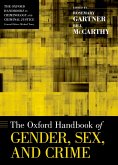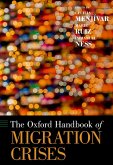The Oxford Handbook of Law and Anthropology (eBook, ePUB)
Redaktion: Foblets, Marie-Claire; Zenker, Olaf; Sapignoli, Maria; Goodale, Mark


Alle Infos zum eBook verschenken

The Oxford Handbook of Law and Anthropology (eBook, ePUB)
Redaktion: Foblets, Marie-Claire; Zenker, Olaf; Sapignoli, Maria; Goodale, Mark
- Format: ePub
- Merkliste
- Auf die Merkliste
- Bewerten Bewerten
- Teilen
- Produkt teilen
- Produkterinnerung
- Produkterinnerung

Hier können Sie sich einloggen

Bitte loggen Sie sich zunächst in Ihr Kundenkonto ein oder registrieren Sie sich bei bücher.de, um das eBook-Abo tolino select nutzen zu können.
The Oxford Handbook of Law and Anthropology is a ground-breaking collection of essays that provides an original and internationally framed conception of the historical, theoretical, and ethnographic interconnections of law and anthropology. Each of the chapters in the Handbook provides a survey of the current state of scholarly debate and an argument about the future direction of research in this dynamic and interdisciplinary field. The structure of the Handbook is animated by an overarching collective narrative about how law and anthropology have and should relate to each other as…mehr
- Geräte: eReader
- mit Kopierschutz
- eBook Hilfe
- Größe: 5.83MB
![The Oxford Handbook of Prosecutors and Prosecution (eBook, ePUB) The Oxford Handbook of Prosecutors and Prosecution (eBook, ePUB)]() Ronald F. WrightThe Oxford Handbook of Prosecutors and Prosecution (eBook, ePUB)90,95 €
Ronald F. WrightThe Oxford Handbook of Prosecutors and Prosecution (eBook, ePUB)90,95 €![The Oxford Handbook of Endangered Languages (eBook, ePUB) The Oxford Handbook of Endangered Languages (eBook, ePUB)]() The Oxford Handbook of Endangered Languages (eBook, ePUB)98,95 €
The Oxford Handbook of Endangered Languages (eBook, ePUB)98,95 €![The Oxford Handbook of ?mile Durkheim (eBook, ePUB) The Oxford Handbook of ?mile Durkheim (eBook, ePUB)]() The Oxford Handbook of ?mile Durkheim (eBook, ePUB)90,95 €
The Oxford Handbook of ?mile Durkheim (eBook, ePUB)90,95 €![The Oxford Handbook of Language and Law (eBook, ePUB) The Oxford Handbook of Language and Law (eBook, ePUB)]() The Oxford Handbook of Language and Law (eBook, ePUB)24,95 €
The Oxford Handbook of Language and Law (eBook, ePUB)24,95 €![The Oxford Handbook of Gender, Sex, and Crime (eBook, ePUB) The Oxford Handbook of Gender, Sex, and Crime (eBook, ePUB)]() The Oxford Handbook of Gender, Sex, and Crime (eBook, ePUB)26,95 €
The Oxford Handbook of Gender, Sex, and Crime (eBook, ePUB)26,95 €![The Oxford Handbook of Developmental and Life-Course Criminology (eBook, ePUB) The Oxford Handbook of Developmental and Life-Course Criminology (eBook, ePUB)]() The Oxford Handbook of Developmental and Life-Course Criminology (eBook, ePUB)87,95 €
The Oxford Handbook of Developmental and Life-Course Criminology (eBook, ePUB)87,95 €![The Oxford Handbook of Migration Crises (eBook, ePUB) The Oxford Handbook of Migration Crises (eBook, ePUB)]() The Oxford Handbook of Migration Crises (eBook, ePUB)98,95 €
The Oxford Handbook of Migration Crises (eBook, ePUB)98,95 €-
-
-
Dieser Download kann aus rechtlichen Gründen nur mit Rechnungsadresse in A, B, BG, CY, CZ, D, DK, EW, E, FIN, F, GR, HR, H, IRL, I, LT, L, LR, M, NL, PL, P, R, S, SLO, SK ausgeliefert werden.
- Produktdetails
- Verlag: Oxford University Press
- Seitenzahl: 952
- Erscheinungstermin: 1. April 2022
- Englisch
- ISBN-13: 9780192577016
- Artikelnr.: 63615493
- Verlag: Oxford University Press
- Seitenzahl: 952
- Erscheinungstermin: 1. April 2022
- Englisch
- ISBN-13: 9780192577016
- Artikelnr.: 63615493
* 1: Carol Greenhouse: Social Control through Law: Critical afterlives
* 2: Martin Chanock: Anthropology, Law, and Empire: Foundations in
context
* 3: Sindiso Mnisi Weeks: South African Legal Culture and its
Dis/empowerment Paradox
* 4: Pratiksha Baxi: The Ethnographic Gaze on State Law in India
* 5: Paul Burke: The Anthropology of Indigenous Australia and Native
Title Claims
* 6: Brian Thom: Encountering Indigenous Law in Canada
* 7: Florian Stammler, Aytalina Ivanova, and Brian Donahoe: Russian
Legal Anthropology: From empirical ethnography to applied innovation
* 8: Armando Guevara Gil: Indigenous Peoples, Identity, and Free,
Prior, and Informed Consultation in Latin America
* 9: Do Dom Kim: Rule of Law and Media in the Making of Legal Identity
in Urban Southern China
* 10: Dominik Müller: Islam, Law, and the State
* 11: Keebet von Benda-Beckmann: Law and Anthropology in the
Netherlands: From Adat Law School to Anthropology of Law
* 12: Frédéric Audren and Laetitia Guerlain: Legal Uses of Anthropology
in France in the 19th and 20th centuries
* 13: Balacz Fekete: Legal Ethnology and Legal Anthropology in Hungary
* 14: Michele Graziadei: The Anthropology of European Law
* Recurring themes in law and anthropology
* 15: Elizabeth Mertz: Within and Beyond the Anthropology of Language
and Law
* 16: Anne Griffiths: Law as an Enduring Concept: Space, time, and
power
* 17: Fernanda Pirie: Legalism: Rules, categories, and texts
* 18: Günter Frankenberg: Legal Transfer
* 19: Thomas Duve: Legal Traditions
* 20: Baudouin Dupret: The Concept of Positive Law and its Relationship
to Religion and Morality
* 21: Matthew Canfield: Property Regimes
* 22: Markus Böckenförde, Berihun Gebeye: Law and Development
* 23: Mark Goodale: Rights and Social Inclusion
* 24: Lynette Chua: Human Rights Activism, Sexuality, and Gender
* Anthropology in law and legal practice
* 25: Alison Dundes Renteln: The Cultural Defence
* 26: Andrzej Jakubowski: Cultural Rights and Cultural Heritage as a
Global Concern
* 27: Faris Nasrallah: Alternative Dispute Resolution
* 28: Richard A. Wilson: Justice after Atrocity
* 29: Marie-Claire Foblets: Kinship through the Twofold Prism of Law
and Anthropology
* 30: Dirk Hanschel, Elizabeth Steyn: Environmental Justice
* Anthropology at the limits of law
* 31: Felix-Anselm van Lier, Katrin Seidel: Constitution Making
* 32: Jennifer Burrell: Vigilantism and Security-making
* 33: Math Noortmann, Juliette Koning: The Normative Complexity of
Private Security: Beyond legal regulation and stigmatization
* 34: Erica Bornstein: Humanitarian Interventions
* 35: Rita Kesselring: Inequality, Victimhood, and Redress
* 36: Katayoun Alidadi: Anti-discrimination Rules and Religious
Minorities in the Workplace
* 37: Priscilla Claeys, Karine Peschard: Transnational Agrarian
Movements, Food Sovereignty, and Legal Mobilization
* 38: Rachel Sieder: The Juridification of Politics
* 39: Meg Davis: The Persistence of Chinese Rights Defenders
* Current directions in law and anthropology
* 40: Sally Engle Merry: The Problem of Compliance and the Turn to
Quantification
* 41: Bert Turner, Melanie Wiber: Law, Science, and Technologies
* 42: Olaf Zenker: Politics of Belonging
* 43: Katia Bianchini: Legal and Anthropological Approaches to
International Refugee Law
* 44: Philipp Dann, Julia Eckert: Norm Creation Beyond the State
* 45: Didier Fassin: Critique of Punitive Reason
* 46: Maria Sapignoli, Ronald Niezen: Global Legal Institutions
* 47: Annelise Riles, Ralf Michaels: Law as Technique
* 48: Kamari Clarke: Emotion, Affect, and Law
* 49: Eve Darian-Smith: Legal Pluralism in Postcolonial, Postnational,
and Postdemocratic Contexts
* 1: Carol Greenhouse: Social Control through Law: Critical afterlives
* 2: Martin Chanock: Anthropology, Law, and Empire: Foundations in
context
* 3: Sindiso Mnisi Weeks: South African Legal Culture and its
Dis/empowerment Paradox
* 4: Pratiksha Baxi: The Ethnographic Gaze on State Law in India
* 5: Paul Burke: The Anthropology of Indigenous Australia and Native
Title Claims
* 6: Brian Thom: Encountering Indigenous Law in Canada
* 7: Florian Stammler, Aytalina Ivanova, and Brian Donahoe: Russian
Legal Anthropology: From empirical ethnography to applied innovation
* 8: Armando Guevara Gil: Indigenous Peoples, Identity, and Free,
Prior, and Informed Consultation in Latin America
* 9: Do Dom Kim: Rule of Law and Media in the Making of Legal Identity
in Urban Southern China
* 10: Dominik Müller: Islam, Law, and the State
* 11: Keebet von Benda-Beckmann: Law and Anthropology in the
Netherlands: From Adat Law School to Anthropology of Law
* 12: Frédéric Audren and Laetitia Guerlain: Legal Uses of Anthropology
in France in the 19th and 20th centuries
* 13: Balacz Fekete: Legal Ethnology and Legal Anthropology in Hungary
* 14: Michele Graziadei: The Anthropology of European Law
* Recurring themes in law and anthropology
* 15: Elizabeth Mertz: Within and Beyond the Anthropology of Language
and Law
* 16: Anne Griffiths: Law as an Enduring Concept: Space, time, and
power
* 17: Fernanda Pirie: Legalism: Rules, categories, and texts
* 18: Günter Frankenberg: Legal Transfer
* 19: Thomas Duve: Legal Traditions
* 20: Baudouin Dupret: The Concept of Positive Law and its Relationship
to Religion and Morality
* 21: Matthew Canfield: Property Regimes
* 22: Markus Böckenförde, Berihun Gebeye: Law and Development
* 23: Mark Goodale: Rights and Social Inclusion
* 24: Lynette Chua: Human Rights Activism, Sexuality, and Gender
* Anthropology in law and legal practice
* 25: Alison Dundes Renteln: The Cultural Defence
* 26: Andrzej Jakubowski: Cultural Rights and Cultural Heritage as a
Global Concern
* 27: Faris Nasrallah: Alternative Dispute Resolution
* 28: Richard A. Wilson: Justice after Atrocity
* 29: Marie-Claire Foblets: Kinship through the Twofold Prism of Law
and Anthropology
* 30: Dirk Hanschel, Elizabeth Steyn: Environmental Justice
* Anthropology at the limits of law
* 31: Felix-Anselm van Lier, Katrin Seidel: Constitution Making
* 32: Jennifer Burrell: Vigilantism and Security-making
* 33: Math Noortmann, Juliette Koning: The Normative Complexity of
Private Security: Beyond legal regulation and stigmatization
* 34: Erica Bornstein: Humanitarian Interventions
* 35: Rita Kesselring: Inequality, Victimhood, and Redress
* 36: Katayoun Alidadi: Anti-discrimination Rules and Religious
Minorities in the Workplace
* 37: Priscilla Claeys, Karine Peschard: Transnational Agrarian
Movements, Food Sovereignty, and Legal Mobilization
* 38: Rachel Sieder: The Juridification of Politics
* 39: Meg Davis: The Persistence of Chinese Rights Defenders
* Current directions in law and anthropology
* 40: Sally Engle Merry: The Problem of Compliance and the Turn to
Quantification
* 41: Bert Turner, Melanie Wiber: Law, Science, and Technologies
* 42: Olaf Zenker: Politics of Belonging
* 43: Katia Bianchini: Legal and Anthropological Approaches to
International Refugee Law
* 44: Philipp Dann, Julia Eckert: Norm Creation Beyond the State
* 45: Didier Fassin: Critique of Punitive Reason
* 46: Maria Sapignoli, Ronald Niezen: Global Legal Institutions
* 47: Annelise Riles, Ralf Michaels: Law as Technique
* 48: Kamari Clarke: Emotion, Affect, and Law
* 49: Eve Darian-Smith: Legal Pluralism in Postcolonial, Postnational,
and Postdemocratic Contexts







